|
|
|
Sort Order |
|
|
|
Items / Page
|
|
|
|
|
|
|
| Srl | Item |
| 1 |
ID:
172127
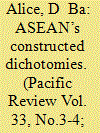

|
|
|
|
|
| Summary/Abstract |
How best to assess ASEAN as a collective enterprise are longstanding. Producing often polar assessments of the organization and its activities, the question has been a recurrent one in the scholarship on ASEAN and any retrospective on the organization. Stubbs’ (2019) article does not resolve the question, but it does offer ways to make sense of the debate. It also identifies ways forward with its identification of analytic criteria by which ASEAN’s performance as an international organization has been assessed. How well his two-camp categorization of the literature captures the state of play, however, can be debated. It is also not without potential costs.
|
|
|
|
|
|
|
|
|
|
|
|
|
|
|
|
| 2 |
ID:
172117
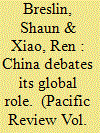

|
|
|
|
|
| Summary/Abstract |
The very simple and straightforward aim of this special issue is to outline and analyse how debates over international politics and China’s global role have evolved in China in recent years. In particular, we want to open up debates that can be found in the Chinese language literature to an audience that might not normally be able to access or understand them. To be sure, there is now a relatively large cohort of Chinese academics publishing in English in high quality outlets and participating in international conferences. Their scholarship and insights have done much to increase knowledge and understanding of Chinese thinking. Even so, we think the time is right for a collection that looks in depth at Chinese debates and discourses for five main reasons.
|
|
|
|
|
|
|
|
|
|
|
|
|
|
|
|
| 3 |
ID:
172123
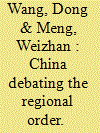

|
|
|
|
|
| Summary/Abstract |
This article examines China’s academic debates on the regional order in Asia since 2012, by surveying nine thematic issues. Those thematic issues are not exhaustive, yet they provide an overview of China’s intellectual landscape on the key issue of the regional order in Asia. This study shows that the United States (US) might have exaggerated China’s strategic intention. Rather than aiming to replace US hegemony with a Chinese-led Tianxia/tributary system in the region, Chinese scholars advocate mutual accommodation between China and the US.
|
|
|
|
|
|
|
|
|
|
|
|
|
|
|
|
| 4 |
ID:
172121
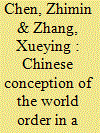

|
|
|
|
|
| Summary/Abstract |
The arrival of the Trump administration in the United States has sent shockwaves through the global system, triggering widespread rethinking of the current world order and its future direction. This happens at a time when China is starting to embrace a more proactive role in shaping the world order, based on its growing national strength and global influence. During the last seven decades, China has transformed itself from a ‘revolutionary order-challenger’ to a ‘reformist order-shaper’. In the post-Cold War hybrid world order, China has gradually developed its view regarding the positive components of the world order which should be maintained, the deficient aspects of the world order to be reformed, and a vision of shared future to be promoted. Facing the challenge of the Trump era, Chinese scholars are debating future scenarios for the world order and how China could position itself and contribute to a more resilient international system. Though worst-case scenarios are considered, cautious optimism is maintained.
|
|
|
|
|
|
|
|
|
|
|
|
|
|
|
|
| 5 |
ID:
172122
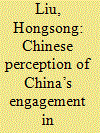

|
|
|
|
|
| Summary/Abstract |
Abstract
With China’s reintegration into the international system its involvement in multilateral initiatives, interactions with international institutions, and participation in global governance have become integral parts of Chinese foreign policy. Chinese scholars have conducted a great deal of research on these topics. The first stage of Chinese scholars’ research centered on China’s multilateral diplomacy and the interaction between China and international institutions, while the second stage focused on China’s participation in global governance. Although some scholars have made substantial achievements, in general, most of the research only interprets the ideas and policies related to global governance proposed by the Chinese government, and has not explained China’s strategies and actions in global governance. Furthermore, Chinese scholars provide little analysis on the dynamics of China’s participation in different issue areas. Many scholars have articulated a series of policy recommendations, but no specific measures have been suggested.
|
|
|
|
|
|
|
|
|
|
|
|
|
|
|
|
| 6 |
ID:
172129
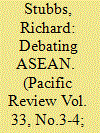

|
|
|
|
|
| Summary/Abstract |
The contributions of Alice D. Ba, Mark Beeson, and Anja Jetschke and Patrick Theiner to the discussion about how to understand and explain ASEAN as a regional organization raise significant issues. Most importantly, their ideas extend our ability as scholars and commentators to productively debate and evaluate the institutional developments and policies of ASEAN and, indeed, all regional organizations.
|
|
|
|
|
|
|
|
|
|
|
|
|
|
|
|
| 7 |
ID:
172124
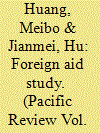

|
|
|
|
|
| Summary/Abstract |
China is playing an increasingly important role in the international aid system, attracting widespread attention both at home and abroad. Chinese scholars, based in China, have a deeper understanding of China's political and economic system and China's foreign aid policies and practices. This article analyzes China's academic schools and points in foreign aid. National leaders' Philosophy of foreign aid is the core of Chinese aid policy. But Chinese scholars have different views on whether China has formed a systematic foreign aid theory. They also have conflicts in the scale of China’s foreign aid and its status in the international aid system. Some Chinese scholars put forward ‘new modes’ for its aid. Through a review of the literature, this article explores China’s four core motivations: political, diplomatic and strategic motivation, economic motivation, development motivation, and humanitarian motivation.
|
|
|
|
|
|
|
|
|
|
|
|
|
|
|
|
| 8 |
ID:
172126


|
|
|
|
|
| Summary/Abstract |
Why do serious scholars come to such different conclusions about the significance and effectiveness of the Association of Southeast Asian Nations? This article responds by a recent article by Richard Stubbs and argues that even some of the best ‘proponents’ of ASEAN see what they want to see in Southeast Asia’s heterogeneous politics and diplomacy, and understate the criticisms made by skeptics. Indeed, ASEAN provides an academic Rorschach test that often reveals as much about the analyst as it does about organization itself.
|
|
|
|
|
|
|
|
|
|
|
|
|
|
|
|
| 9 |
ID:
172119


|
|
|
|
|
| Summary/Abstract |
Over the years, this author has been involved in the ‘Chinese school of International Relations (IR)’ debate. In this article I try to reflect on these discussions or debates from which some insights can be retrieved to inform future research and further growth of a Chinese School of IR. Should a Chinese school be set as the goal? If so, how should this be pursued? This debate and the relevant efforts have proved to be a promising movement in the Chinese IR community, demonstrating that a Chinese school of IR is inevitable and it actually is evolving. A theory is a generalization or cluster of generalizations. This article argues that from the ‘Tsinghua approach’, a ‘moral realism’ has sprung up. Qin Yaqin’s theorizing is centered around relationality and has been productive. A theory of symbiosis in the world community is being developed by a group of Shanghai-based scholars, and a ‘symbiosis school’ has grown up. Overall, four distinct theories of Chinese origins, i.e., relational theory, moral realism, tianxia theory and gongsheng/symbiotic theory, have appeared. Thus, IR theory-building in China in the first two decades of the 21st century has rendered the question ‘why there is no IR theory in China’ obsolete.
|
|
|
|
|
|
|
|
|
|
|
|
|
|
|
|
| 10 |
ID:
172125


|
|
|
|
|
| Summary/Abstract |
There have been many academic debates in the Chinese academic circle of international law during the past few decades. Both positive and negative attitudes were presented on the functioning of international law within the world order, while different understandings were provided on China’s dealings with international law and various views were expressed on frontier issues of international law. The debates were also reflected in and through China’s diplomatic position and discourse, and have influenced China’s stance and concepts in relation to international affairs.
|
|
|
|
|
|
|
|
|
|
|
|
|
|
|
|
| 11 |
ID:
172132
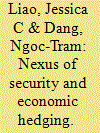

|
|
|
|
|
| Summary/Abstract |
Hedging has been a widely discussed concept in explaining East Asian states’ counteracting policies in the face of great power competition. However, the current literature has yet to specify how hedging responds to great power competition in economic statecraft, namely, using economic means to influence other states. This paper examines Vietnam’s response to Japan and China’s infrastructure financing programs over the past three decades. Through a combination of quantitative and qualitative data, it explains how Vietnam, while following economic pragmatism, does not simply aim to maximize gains from these two powers. Vietnam’s decisions embody what we call economic hedging, or a cautious calculation over the linkage between security risks and infrastructure partnership and a tendency to pivot away from infrastructure partners deemed risky, namely, China. It also shows that such caution has intensified in the face of a nationalistic public that has challenged the notion of economic pragmatism, pushed a realist approach to economic relations with China, and bolstered Hanoi to take more action to protect Vietnamese sovereignty from Chinese economic influence. The convergence of these domestic and international trends have driven Hanoi to enhance collaboration with Japan, which it views as an increasingly important strategic partner.
|
|
|
|
|
|
|
|
|
|
|
|
|
|
|
|
| 12 |
ID:
172130


|
|
|
|
|
| Summary/Abstract |
Japanese Prime Minister Shinzo Abe has shown a keen interest in his country’s relationship with India with an intention to protect Japan’s stake in maritime affairs under the ‘Indo-Pacific’ concept. In evaluating Japan’s India strategy, a particularly important factor is China’s regional presence. This article, through an analysis of Japan’s India policy during 2013–18, seeks to address the following two questions. First, how has Japan’s India diplomacy under Prime Minister Abe in politics, security, and economics been influenced by its strategies towards China? Second, how can Japan’s diplomatic policies towards India be evaluated in terms of key concepts in relation to a state’s foreign policy responses? The exploration of the development of Japan’s India diplomacy, the geopolitical and geo-economic factors behind it, and the strategic nature of the diplomatic policies enables us to understand the prospect of increasingly important Japan–India relations and their strategic implications for rapidly evolving regional politics.
|
|
|
|
|
|
|
|
|
|
|
|
|
|
|
|
| 13 |
ID:
172131


|
|
|
|
|
| Summary/Abstract |
State activism is strengthening in the Indonesian economy. One major aspect of this recent strengthening is the government’s mobilisation of public entities to provide patient capital for development projects. Joko Widodo’s government (2014–2019) has injected a significant amount of capital into these development ‘financiers’ across diverse sectors. This strategy has served as the government’s response to the shrinking external development finance, the underdeveloped domestic capital market, and the limitations of Indonesia’s former development model. Along with a notable expansion in the size of development financiers, significant transformation of missions, targets, and policy tools has occurred over a short time span. More precisely, Indonesia’s major development financiers have begun to focus on accelerating strategic infrastructure development and industrialisation and supporting state enterprises in related areas. On top of dealing with immediate development challenges, the growth and transformation of development financiers have also had an effect of expanding the government’s policy space. The Indonesian government now has a greater capacity to autonomously mobilise public capital to fund development projects.
|
|
|
|
|
|
|
|
|
|
|
|
|
|
|
|
| 14 |
ID:
172120
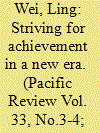

|
|
|
|
|
| Summary/Abstract |
Since the doctrine of ‘keeping a low profile (KLP), attaining some achievement (ASA)’ was developed, there has been much attention and study of the KLP, but little discussion of the ASA. However, it is exactly how the ASA has been observed that can well reflect Chinese perception of its global role. In the paper, the ASA is treated as a continuum or a fluid concept with changing values. There have been significant adjustments in the official expression of the ASA doctrine since the 2008 global financial crisis, from the original ‘attaining some achievement’ to ‘proactively attaining achievement’ around 2011, ‘striving for achievement’ in 2013, and ‘striving for achievement in a new era’ in 2017. Along with these changes, there have been roughly three rounds of debates on the ASA among Chinese scholars. While they generally agree on more proactive diplomacy in attaining achievement, scholars have debated on what achievements to attain and how to attain these achievements. While the ultimate goal is defined officially as Chinese rejuvenation, specific and interim goals of ‘striving for achievement’ in scholarly debates have targeted mainly China’s strategic capability, institutional power and normative power. Chinese scholars have also debated on the general principles, diplomatic style and tactics that China should follow by focusing on three relationships: the relationship between the KLP and the ASA, the Sino-US relationship, and the relationship between China and the international system. The author provides an analytical framework and thorough examination of the development of the ASA doctrine, and presents the scholarly debates along its development path, in the hope that this study may facilitate the understanding of the outside world on how China perceives its global role.
|
|
|
|
|
|
|
|
|
|
|
|
|
|
|
|
| 15 |
ID:
172118
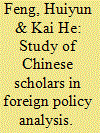

|
|
|
|
|
| Summary/Abstract |
A review of studies of China’s foreign policy reveals three dominant methods: the area studies approach, the IR theory method, and the integrated approach. We suggest that it is time to pay close attention to an emerging research program focusing on the study of Chinese international relations (IR) scholars, especially their internal debates, as a new venue to understand China’s foreign policy. Although Chinese IR scholars are normally quoted as valuable sources in the study of Chinese foreign policy in general, there is no systematic study of China’s IR scholars per se. In order to transform the study of Chinese IR scholars to a full-fledged research program, researchers need to pursue theoretical innovations on the relationship between different types of IR scholars and foreign policy inquiries, advance multi-method research designs across the different methods of field interviews, textual analysis, and opinion surveys, as well as encourage international collaboration between Chinese scholars and non-Chinese scholars.
|
|
|
|
|
|
|
|
|
|
|
|
|
|
|
|
| 16 |
ID:
172128


|
|
|
|
|
| Summary/Abstract |
The question of the significance of ASEAN is an important one. Stubbs' observation that different standards have been used to assess the organization is right to the point. This article critically discusses the merits of Stubbs approach and his findings. Our response argues that the binary discussion about ASEAN’s relevance should be replaced by more productive and progressive lines of scientific inquiry, since these questions hardly ever produce the knock-out evidence needed to discard one theory. The more interesting research takes place within paradigms. In the case of institutionalism, this is for example the research program of the design of international institutions. It is here that better data has recently become available, and that some questions that have triggered lively debates on ASEAN can now be answered. We then present select results of a large-N project comparing regional organizations with a view of what we have learned about ASEAN.
|
|
|
|
|
|
|
|
|
|
|
|
|
|
|
|
|
|
|
|
|